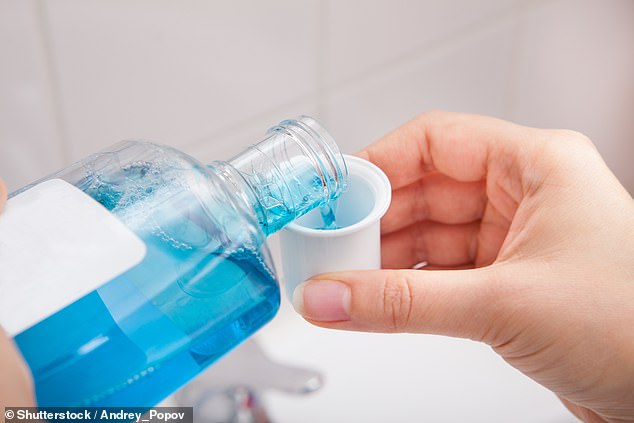The truth about mouthwash: Experts say it can raise your blood pressure and increase your risk of diabetes. So is it worth using it or should you throw it away immediately?
A mouthwash rinse is part of many people’s daily dental routine – whether it’s to freshen breath or prevent tooth decay.
But while a quarter of the population uses mouthwash, new evidence shows it does more harm than good.
Research has shown that antiseptic mouthwash is linked to an increased risk of high blood pressure and other medical conditions, with its bactericidal properties believed to be the cause.
So what’s going on and should you use it?
Antibiotic use is known to disrupt the gut microbiome – the colony of microbes including bacteria that play an important role in our digestive and immune systems by eradicating good and bad bacteria.
Research has shown that antiseptic mouthwash is linked to an increased risk of high blood pressure and other medical conditions
Now attention is turning to the oral microbiome – the diverse colony of microbes in our mouths – and specifically how using mouthwash can wipe out some of the good bacteria that help protect our bodies against conditions like heart disease and type 2 diabetes.
‘Your mouth is filled with hundreds of types of bacteria and while some cause plaque and decay, others are actually very good for your health and responsible for quite complex processes in the body,’ says Dr Zoe Brookes, Associate Professor of Dental Education and Research at the University of Plymouth.
‘For example, bacteria live on the tongue that convert nitrates from the food we eat into nitrites, which are then converted into nitric oxide in the intestines. Nitric oxide effectively tells our blood vessels to relax, keeping our blood pressure nice and low. explains Dr. Brookes, who led a 2020 study on the effects of mouthwash on the oral microbiome.
‘A number of studies have shown that using mouthwashes – especially brands containing the antiseptic chlorhexidine – can lead to an increase in blood pressure, especially in people who already have high blood pressure.’
A 2019 study at the University of Puerto Rico found that people who used mouthwash twice a day or more had a greater risk of high blood pressure compared to less frequent users.
And a 2017 study by the same Puerto Rico research group found that overweight people who used mouthwash at least twice a day had a 50 percent increased risk of developing type 2 diabetes over three years compared to non-users.
The researchers said that killing these important oral bacteria reduces the body’s ability to produce nitric acid, which in turn prevents the effective breakdown of blood sugar levels – causing dangerous blood sugar spikes that can lead to diabetes over time.

Dr. Brookes said: ‘Keeping our teeth and gums healthy is more important than ever – especially when so many people can’t even get an NHS dentist at the moment.’
And that’s not the only potentially harmful side effect of mouthwash. A 2020 study published in the Journal Intensive Care Medicine found that antiseptic mouthwash used by hospitalized patients may increase the risk of death from sepsis – a life-threatening condition that occurs when the immune system of the body overreacting to an infection, causing organ failure and sometimes death.
Scientists aren’t sure what’s behind the increased risk, but suggest that killing the oral bacteria responsible for nitric acid production prevents the body from absorbing enough of this compound, which plays a key role in healthy circulation – and we know that circulation is one of the most important factors. of the body systems that shut down in sepsis.
The benefits of mouthwash must be weighed against this.
‘There is, of course, also good evidence that when patients use mouthwashes containing the antiseptic chlorhexidine (in addition to brushing their teeth), they reduce the plaque that causes tooth decay and early gum disease,’ says Dr Brookes.

A number of studies have found that using mouthwashes – especially brands containing the antiseptic chlorhexidine – can lead to an increase in blood pressure
‘But it’s a double-edged sword, because chlorhexidine is so powerful that it kills many different types of bacteria, including the good ones. And by throwing our oral microbiome out of balance in this way, we can indirectly impact not only our heart health, but also increase the risk of succumbing to other problems like sepsis, as well as contributing to the broader problem of antibiotic resistance,” she adds.
Should we pour our mouthwash down the drain?
‘Not necessarily,’ says Dr Brookes, ‘there is concern, but on the other hand we also have a huge amount of evidence that gum disease itself is linked to uncontrolled diabetes and cardiovascular disease, so it is more important to look after our teeth and gums to keep healthy. than ever – especially when so many people can’t even get an NHS dentist at the moment.
‘As a dentist, my advice differs per patient, and I always ask myself whether the benefits of using mouthwash outweigh any personal risks for the patient.’
